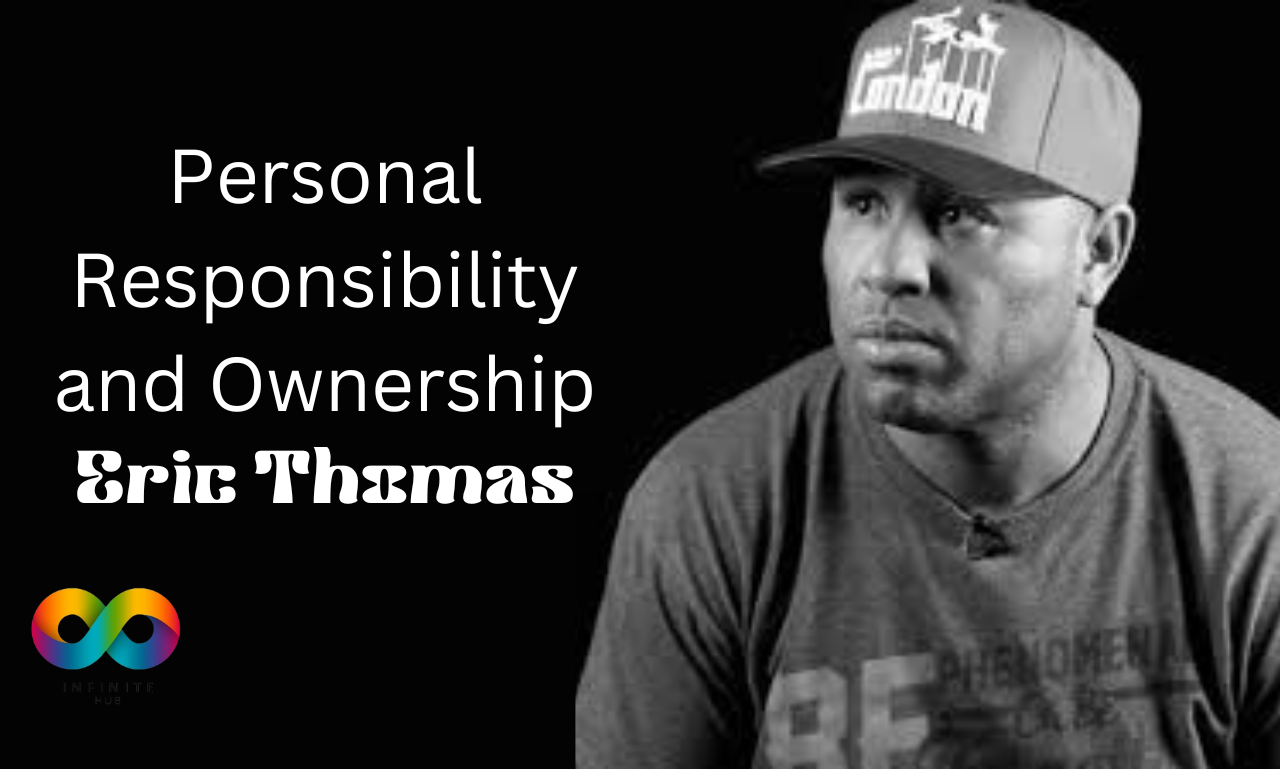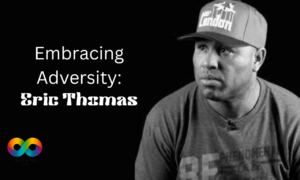Introduction
In a world where external factors often dominate our lives, the concept of personal responsibility and ownership stands out as a beacon of empowerment. Motivational speaker Eric Thomas, widely known as ET, emphasizes these principles as key drivers of success and personal fulfillment. By embracing personal responsibility and ownership, individuals can transform their lives, careers, and relationships. This article delves into the significance of these concepts, drawing on Eric Thomas’s teachings to provide practical guidance and inspiration.
| Outline |
|---|
| Introduction |
| Understanding Personal Responsibility |
| – Definition of Personal Responsibility |
| – Historical Perspectives |
| – Psychological Benefits |
| The Essence of Ownership |
| – Definition of Ownership |
| – Key Elements of Ownership |
| – Differences Between Responsibility and Ownership |
| Eric Thomas: A Brief Biography |
| – Early Life and Challenges |
| – Rise to Prominence |
| – Key Teachings |
| The Role of Personal Responsibility in Success |
| – Personal Accountability |
| – Goal Setting |
| – Overcoming Obstacles |
| Ownership and Career Advancement |
| – Professional Growth |
| – Leadership Skills |
| – Entrepreneurship |
| Building Strong Relationships Through Responsibility |
| – Personal Relationships |
| – Professional Relationships |
| – Community Involvement |
| Eric Thomas’s Strategies for Embracing Responsibility |
| – Daily Habits |
| – Mindset Shifts |
| – Practical Exercises |
| The Impact of Ownership on Mental Health |
| – Stress Reduction |
| – Increased Resilience |
| – Positive Self-Image |
| Case Studies and Success Stories |
| – Real-Life Examples |
| – Lessons Learned |
| – Practical Applications |
| Common Pitfalls and How to Avoid Them |
| – Procrastination |
| – Blame Culture |
| – Lack of Self-Discipline |
| FAQs |
| – What is personal responsibility? |
| – How can I develop a sense of ownership? |
| – Why is Eric Thomas a prominent figure in motivational speaking? |
| – How does personal responsibility affect career growth? |
| – Can taking ownership improve mental health? |
| – What are common obstacles to personal responsibility? |
| Conclusion |
| Custom Message |
Understanding Personal Responsibility
Definition of Personal Responsibility
Personal responsibility refers to the duty of individuals to take charge of their actions, decisions, and their subsequent consequences. It involves recognizing one’s role in shaping their life and understanding that they have control over their choices.
Historical Perspectives
Throughout history, philosophers and thought leaders have emphasized the importance of personal responsibility. From Socrates to contemporary thinkers, the idea that individuals must be accountable for their actions has been a central theme in ethical and moral discourse.
Psychological Benefits
Embracing personal responsibility can lead to significant psychological benefits, including increased self-esteem, better stress management, and a stronger sense of autonomy. When individuals take responsibility for their actions, they often experience a greater sense of control over their lives.
The Essence of Ownership
Definition of Ownership
Ownership goes beyond mere responsibility; it involves taking full control and stewardship over one’s actions, decisions, and life outcomes. It is about claiming one’s role in the grand scheme of their life narrative.
Key Elements of Ownership
- Accountability: Being answerable for one’s actions.
- Proactivity: Anticipating and taking charge of situations.
- Commitment: Dedicating oneself to continuous improvement.
Differences Between Responsibility and Ownership
While responsibility often involves acknowledging one’s role, ownership entails a deeper, more proactive engagement. Ownership means not only recognizing one’s duties but also actively pursuing excellence and improvement in all endeavors.
Eric Thomas: A Brief Biography
Early Life and Challenges
Eric Thomas’s journey from homelessness to becoming a world-renowned motivational speaker is a testament to the power of personal responsibility and ownership. Born into poverty, Thomas faced numerous challenges but used these adversities as fuel for his personal growth.
Rise to Prominence
Thomas’s rise to prominence began with his passionate speeches, which he initially delivered to small groups and later expanded to global audiences. His powerful messages of perseverance and accountability resonated with many, earning him the nickname “ET the Hip Hop Preacher.”
Key Teachings
Thomas’s teachings revolve around the principles of hard work, accountability, and relentless pursuit of one’s goals. He advocates for a mindset shift that emphasizes personal responsibility and ownership as pathways to success.
The Role of Personal Responsibility in Success
Personal Accountability
Accountability is a cornerstone of success. By holding oneself accountable, individuals can track their progress, recognize areas for improvement, and stay committed to their goals. This self-awareness fosters continuous personal and professional growth.
Goal Setting
Setting clear, achievable goals is an essential part of personal responsibility. Goals provide direction and a sense of purpose, helping individuals focus their efforts and measure their progress.
Overcoming Obstacles
Personal responsibility equips individuals with the resilience needed to overcome obstacles. By accepting challenges as opportunities for growth, people can navigate setbacks with a positive, proactive mindset.
Ownership and Career Advancement
Professional Growth
Taking ownership of one’s career involves actively seeking opportunities for learning and development. This proactive approach can lead to significant professional advancements and job satisfaction.
Leadership Skills
Effective leaders embody the principles of ownership. By taking responsibility for their team’s successes and failures, leaders can inspire trust and foster a collaborative, accountable work environment.
Entrepreneurship
For entrepreneurs, ownership is crucial. Building and running a successful business requires a high level of accountability and commitment. Entrepreneurs must be willing to take risks and accept full responsibility for their ventures.
Building Strong Relationships Through Responsibility
Personal Relationships
In personal relationships, taking responsibility for one’s actions can lead to healthier, more fulfilling connections. It involves being accountable for one’s behavior and its impact on others, fostering trust and mutual respect.
Professional Relationships
In the workplace, ownership can enhance teamwork and collaboration. When individuals take responsibility for their tasks and contributions, it creates a culture of reliability and mutual support.
Community Involvement
Taking responsibility within one’s community involves actively contributing to its well-being. This can range from volunteer work to participating in local initiatives, demonstrating a commitment to the collective good.
Eric Thomas’s Strategies for Embracing Responsibility
Daily Habits
Thomas emphasizes the importance of daily habits in fostering personal responsibility. Consistent, positive routines can help individuals stay focused and committed to their goals.
Mindset Shifts
Changing one’s mindset is crucial for embracing personal responsibility. Thomas advocates for a shift from a victim mentality to one of empowerment and control.
Practical Exercises
Thomas suggests practical exercises such as journaling, self-reflection, and setting daily intentions to reinforce personal responsibility and ownership.
The Impact of Ownership on Mental Health
Stress Reduction
Taking ownership of one’s life can significantly reduce stress. When individuals feel in control of their circumstances, they are better equipped to handle stressors and challenges.
Increased Resilience
Ownership fosters resilience by encouraging individuals to face challenges head-on. This proactive approach builds mental toughness and adaptability.
Positive Self-Image
Embracing personal responsibility and ownership can enhance self-esteem and self-worth. Individuals who take charge of their lives often develop a more positive self-image and greater confidence.
Case Studies and Success Stories
Real-Life Examples
Numerous success stories illustrate the power of personal responsibility and ownership. From entrepreneurs to athletes, individuals who have embraced these principles have achieved remarkable success.
Lessons Learned
These stories offer valuable lessons on the importance of accountability, persistence, and proactive behavior. They demonstrate that taking control of one’s life can lead to extraordinary achievements.
Practical Applications
Applying these lessons in everyday life involves setting clear goals, maintaining a positive mindset, and consistently taking action towards one’s aspirations.
Common Pitfalls and How to Avoid Them
Procrastination
Procrastination is a common obstacle to personal responsibility. Overcoming it requires setting clear priorities and staying disciplined in one’s actions.
Blame Culture
A culture of blame undermines personal responsibility. Avoiding this involves fostering an environment of accountability and constructive feedback.
Lack of Self-Discipline
Self-discipline is crucial for maintaining personal responsibility. Developing habits of consistency and perseverance can help individuals stay on track.
FAQs
What is personal responsibility?
Personal responsibility involves taking charge of one’s actions and decisions, recognizing the impact of these choices, and being accountable for the outcomes.
How can I develop a sense of ownership?
Developing a sense of ownership involves adopting a proactive mindset, setting clear goals, and committing to continuous improvement and accountability.
Why is Eric Thomas a prominent figure in motivational speaking?
Eric Thomas is renowned for his powerful speeches and teachings on personal responsibility, resilience, and success. His journey from adversity to success inspires many.
How does personal responsibility affect career growth?
Personal responsibility fosters professional growth by encouraging individuals to take charge of their development, seek opportunities, and remain accountable for their performance.
Can taking ownership improve mental health?
Yes, taking ownership can improve mental health by reducing stress, increasing resilience, and enhancing self-esteem and self-worth.
What are common obstacles to personal responsibility?
Common obstacles include procrastination, a blame culture, and a lack of self-discipline. Overcoming these challenges involves setting clear goals, fostering accountability, and developing consistent habits.
Conclusion
Embracing personal responsibility and ownership is a transformative journey that can lead to profound personal and professional growth. Inspired by Eric Thomas’s teachings, individuals can take control of their lives, overcome obstacles, and achieve their goals. By cultivating a mindset of accountability and proactive engagement, we can unlock our true potential and lead fulfilling, successful lives.
============================================



